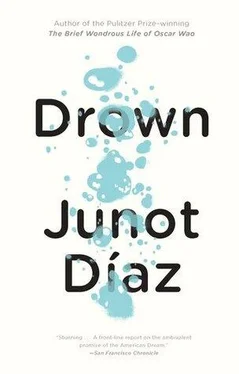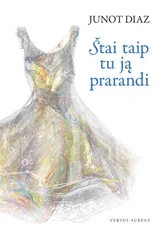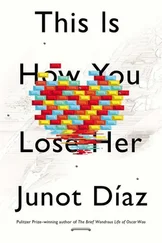Shit, he said. Where did you learn that?
I shrugged.
Tell me. He hated when I knew something he didn’t. He put his hands on my shoulders and pushed me under. He was wearing a cross and cutoff jeans. He was stronger than me and held me down until water flooded my nose and throat. Even then I didn’t tell him; he thought I didn’t read, not even dictionaries.
We live alone. My mother has enough for the rent and groceries and I cover the phone bill, sometimes the cable. She’s so quiet that most of the time I’m startled to find her in the apartment. I’ll enter a room and she’ll stir, detaching herself from the cracking plaster walls, from the stained cabinets, and fright will pass through me like a wire. She has discovered the secret to silence: pouring café without a splash, walking between rooms as if gliding on a cushion of felt, crying without a sound. You have traveled to the East and learned many secret things, I’ve told her. You’re like a shadow warrior.
And you’re like a crazy, she says. Like a big crazy.
When I come in she’s still awake, her hands picking clots of lint from her skirt. I put a towel down on the sofa and we watch television together. We settle on the Spanish-language news: drama for her, violence for me. Today a child has survived a seven-story fall, busting nothing but his diaper. The hysterical baby-sitter, about three hundred pounds of her, is head-butting the microphone.
It’s a goddamn miraclevilla, she cries.
My mother asks me if I found Beto. I tell her that I didn’t look.
That’s too bad. He was telling me that he might be starting at a school for business.
So what?
She’s never understood why we don’t speak anymore. I’ve tried to explain, all wise-like, that everything changes, but she thinks that sort of saying is only around so you can prove it wrong.
He asked me what you were doing.
What did you say?
I told him you were fine.
You should have told him I moved.
And what if he ran into you?
I’m not allowed to visit my mother?
She notices the tightening of my arms. You should be more like me and your father.
Can’t you see I’m watching television?
I was angry at him, wasn’t I? But now we can talk to each other.
Am I watching television here or what?
Saturdays she asks me to take her to the mall. As a son I feel I owe her that much, even though neither of us has a car and we have to walk two miles through redneck territory to catch the M15.
Before we head out she drags us through the apartment to make sure the windows are locked. She can’t reach the latches so she has me test them. With the air conditioner on we never open windows but I go through the routine anyway. Putting my hand on the latch is not enough — she wants to hear it rattle. This place just isn’t safe, she tells me. Lorena got lazy and look what they did to her. They punched her and kept her locked up in her place. Those morenos ate all her food and even made phone calls. Phone calls!
That’s why we don’t have long-distance, I tell her but she shakes her head. That’s not funny, she says.
She doesn’t go out much, so when she does it’s a big deal. She dresses up, even puts on makeup. Which is why I don’t give her lip about taking her to the mall even though I usually make a fortune on Saturdays, selling to those kids going down to Belmar or out to Spruce Run.
I recognize like half the kids on the bus. I keep my head buried in my cap, praying that nobody tries to score. She watches the traffic, her hands somewhere inside her purse, doesn’t say a word.
When we arrive at the mall I give her fifty dollars. Buy something, I say, hating the image I have of her, picking through the sale bins, wrinkling everything. Back in the day, my father would give her a hundred dollars at the end of each summer for my new clothes and she would take nearly a week to spend it, even though it never amounted to more than a couple of t-shirts and two pairs of jeans. She folds the bills into a square. I’ll see you at three, she says.
I wander through the stores, staying in sight of the cashiers so they won’t have reason to follow me. The circuit I make has not changed since my looting days. Bookstore, record store, comic-book shop, Macy’s. Me and Beto used to steal like mad from these places, two, three hundred dollars of shit in an outing. Our system was simple — we walked into a store with a shopping bag and came out loaded. Back then security wasn’t tight. The only trick was in the exit. We stopped right at the entrance of the store and checked out some worthless piece of junk to stop people from getting suspicious. What do you think? we asked each other. Would she like it? Both of us had seen bad shoplifters at work. All grab and run, nothing smooth about them. Not us. We idled out of the stores slow, like a fat seventies car. At this, Beto was the best. He even talked to mall security, asked them for directions, his bag all loaded up, and me, standing ten feet away, shitting my pants. When he finished he smiled, swinging his shopping bag up to hit me.
You got to stop that messing around, I told him. I’m not going to jail for bullshit like that.
You don’t go to jail for shoplifting. They just turn you over to your old man.
I don’t know about you, but my pops hits like a motherfucker.
He laughed. You know my dad. He flexed his hands. The nigger’s got arthritis.
My mother never suspected, even when my clothes couldn’t all fit in my closet, but my father wasn’t that easy. He knew what things cost and knew that I didn’t have a regular job.
You’re going to get caught, he told me one day. Just you wait. When you do I’ll show them everything you’ve taken and then they’ll throw your stupid ass away like a bad piece of meat.
He was a charmer, my pop, a real asshole, but he was right. Nobody can stay smooth forever, especially kids like us. One day at the bookstore, we didn’t even hide the drops. Four issues of the same Playboy for kicks, enough audio books to start our own library. No last minute juke either. The lady who stepped in front of us didn’t look old, even with her white hair. Her silk shirt was half unbuttoned and a silver horn necklace sat on the freckled top of her chest. I’m sorry fellows, but I have to check your bag, she said. I kept moving, and looked back all annoyed, like she was asking us for a quarter or something. Beto got polite and stopped. No problem, he said, slamming the heavy bag into her face. She hit the cold tile with a squawk, her palms slapping the ground. There you go, Beto said.
Security found us across from the bus stop, under a Jeep Cherokee. A bus had come and gone, both of us too scared to take it, imagining a plainclothes waiting to clap the cuffs on. I remember that when the rent-a-cop tapped his nightstick against the fender and said, You little shits better come out here real slow, I started to cry. Beto didn’t say a word, his face stretched out and gray, his hand squeezing mine, the bones in our fingers pressing together.
Nights I drink with Alex and Danny. The Malibou Bar is no good, just washouts and the sucias we can con into joining us. We drink too much, roar at each other and make the skinny bartender move closer to the phone. On the wall hangs a cork dartboard and a Brunswick Gold Crown blocks the bathroom, its bumpers squashed, the felt pulled like old skin.
When the bar begins to shake back and forth like a rumba, I call it a night and go home, through the fields that surround the apartments. In the distance you can see the Raritan, as shiny as an earthworm, the same river my homeboy goes to school on. The dump has long since shut down, and grass has spread over it like a sickly fuzz, and from where I stand, my right hand directing a colorless stream of piss downward, the landfill might be the top of a blond head, square and old.
Читать дальше












